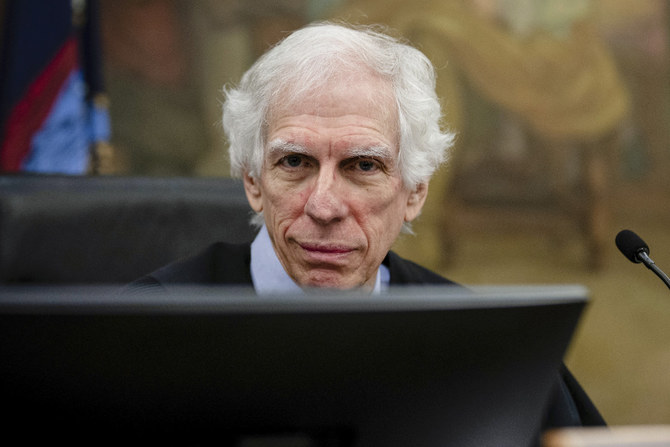NEW YORK: Donald Trump won’t make his own closing argument after all in his New York civil business fraud trial after his lawyers objected to the judge’s insistence that the former president stick to “relevant” matters and “not deliver a campaign speech.”
Judge Arthur Engoron nixed Trump’s unusual plan on Wednesday, a day ahead of closing arguments.
The judge had initially indicated he was open to the idea, saying he’d let Trump speak if he agreed to abide by rules that apply to attorneys’ closing arguments. Among other things, Engoron wanted the former president and current Republican front-runner to promise he wouldn’t assail his adversaries in the case, the judge or others in the court system.
Trump’s legal team said those limitations unfairly muzzled him. When Engoron didn’t hear from them by a Wednesday deadline, the judge told them he assumed Trump was not agreeing to the restrictions and therefore would not be speaking.
“MEAN & NASTY,” Trump wrote of the judge’s decision on his Truth Social platform. Trump indicated he will still attend Thursday’s court proceeding and reiterated his desire to “personally do the closing argument.”
The trial could cost Trump hundreds of millions of dollars in penalties and strip him of his ability to do business in New York. He’s fighting allegations that his net worth was inflated by billions of dollars on financial statements that helped him secure business loans and insurance.
The former president denies any wrongdoing, and he has lambasted the case as a “hoax” and a political attack on him. The judge is a Democrat, as is New York Attorney General Letitia James, who brought the lawsuit.
The trial came after Engoron decided, in a pretrial ruling, that Trump had engaged in fraud for years. The judge ordered at that point that a receiver take control of some of the ex-president’s properties, but an appeals court has put that order on hold.
The trial concerns remaining claims of conspiracy, insurance fraud and falsifying business records. Engoron will decide the verdict.
It’s extremely uncommon for people who have lawyers to give their own closing arguments. But Trump’s lawyers had signaled privately to the judge last week that the ex-president planned to deliver a summation personally, in addition to arguments from his legal team. James’ office objected, saying that the proposal would effectively amount to testimony without cross-examination.
In an email exchange filed in court Wednesday, Engoron initially approved the request, saying he was “inclined to let everyone have his or her say.”
But he said Trump’s remarks would have to stay within the bounds of “commentary on the relevant, material facts that are in evidence, and application of the relevant law to those facts.”
Trump would not be allowed to introduce new evidence, “comment on irrelevant matters” or “deliver a campaign speech” — or impugn the judge, his staff, the attorney general, her lawyers or the court system, the judge wrote.
Trump attorney Christopher Kise responded that those limitations were “fraught with ambiguities, creating the substantial likelihood for misinterpretation or unintended violation.” Engoron said that they were ”reasonable, normal limits” and would allow for comments on the attorney general’s arguments but not personal attacks.
Kise termed the restrictions “very unfair.”
“You are not allowing President Trump, who has been wrongfully demeaned and belittled by an out of control, politically motivated attorney general, to speak about the things that must be spoken about,” the attorney wrote.
“I won’t debate this yet again. Take it or leave it,” the judge shot back, with an all-caps addition saying he wouldn’t push back an already extended and imminent deadline to resolve the matter. The deadline passed without a response from Trump’s lawyers.
Earlier in the exchange, the judge also denied Kise’s request to postpone closing arguments until Jan. 29 because of the death Tuesday of Trump’s mother-in-law, Amalija Knavs. The judge expressed condolences but said he was sticking to the scheduled date, citing the security and logistics required for Trump’s planned visit to court.
Taking on a role usually performed by an attorney is dicey for any defendant, and summations are a last chance to try to show how the evidence from the trial has or hasn’t met legal requirements for proving the case.
A closing argument isn’t constrained to the question-and-answer format of testimony. But “it’s absolutely not a free-for-all,” said Christine Bartholomew, a University at Buffalo School of Law professor who specializes in civil procedure.
“Unless you’re legally trained … the chance of a misstep is really, really high,” she said, adding that it’s “extra-risky” when a judge has already taken issue with a defendant’s conduct during the case.
Trump ran afoul of Engoron after making a disparaging social media post about the judge’s law clerk on the trial’s second day. The post included a false insinuation about the clerk’s personal life.
Engoron then imposed a limited gag order, barring all participants in the trial from commenting publicly about court staffers. The judge later fined Trump a total of $15,000, saying he’d repeatedly violated the order. Trump’s defense team is appealing it.
During the recent email exchange about Trump’s potential summation, Engoron warned Trump’s lawyers that if the former president violated the gag order, he’d be removed from the courtroom and fined at least $50,000.
Trump testified in November, sparring verbally with the judge and state lawyers as he defended himself and his real estate empire. He later considered but ultimately decided against a second round of testimony, explaining that he had “nothing more to say.”


























